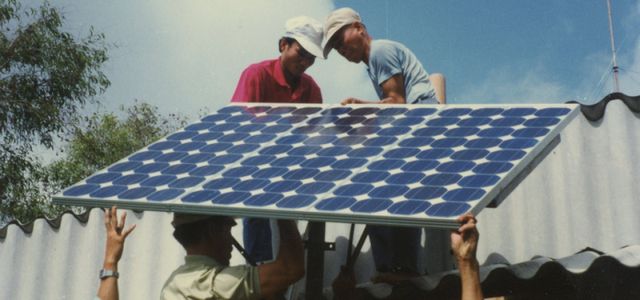2015 marks an important year for international climate politics. The challenge is to find ways in which economic growth can be decoupled from greenhouse gas emissions and fossil fuel consumption. In some parts of the world, this decoupling trend is already happening, as a recent Heinrich Boell Foundation study finds.

(Photo by Solar Electric Light Fund, https://www.flickr.com/photos/solarelectriclightfund, modified, CC BY-NC-ND 2.0)
The transformation of economic growth towards a lower dependency on fossil fuels and related greenhouse gas (GHG) emissions is essential for the feasibility of a successful global climate strategy. The year 2014 was the first in decades that saw worldwide economic growth and a reduction of energy-related GHG emissions. A new study by the Heinrich Boell Foundation attempts to explore these developments and illuminate the drivers through descriptive data analysis, a review of empirical research and a regression analysis. The assessment covers data for the period 1990 to 2014 and includes economic growth, energy-related GHG emissions, energy consumption and energy carriers for 34 countries. Particular emphasis is put on the often-cited examples of China, the US and Germany, which are then compared with the OECD aggregate, India and the worldwide picture.
The study distinguishes weak and strong decoupling of energy consumption from economic growth to analyze specific evolutions. Weak decoupling is defined as a reduction of energy intensity, i.e., energy consumption per GDP, while absolute consumption still rises with economic growth. Strong decoupling is present, if total energy consumption falls with economic growth. Furthermore, this concept is applied to the analysis of decoupling from GHG emissions and to decoupling from conventional energy as the sum of nuclear and fossil energy consumption. Regarding the past decade, it turns out that global growth went along with an increase of energy use, and that despite a steady decrease of conventional energy intensity. This weak decoupling process was facilitated by greater energy efficiency and the roll-out of renewables. Since 2004, solar and wind have been the fastest growing energy sources worldwide, and they saw substantially accelerated growth over the last four years. This is true for China, India and the OECD group of countries. Moreover, our empirical assessment of the causal relationships suggests that renewables may even promote economic growth. For climate policy this presents an optimistic perspective. In particular, the OECD countries show a strong decoupling of conventional energy and of emissions over the last decade. As exemplified by Germany, a successful renewable energy strategy combined with substantial energy savings will result in substantial emissions reductions – and that
despite the phasing out of nuclear energy.
China and India are of particular importance for global trends due to their high growth rates. However, their growth follows diverging patterns. While on a continued economic growth path, China succeeded in a weak decoupling from conventional energy requirements and emissions. Moreover, strong decoupling seems possible in the near future. In 2014, China stopped the expansion of coal use and met the modest 3% growth in energy consumption mainly with less emission intensive energy sources such as natural gas, wind and solar power. By contrast, India’s renewable energy expansion is more than canceled out by investment in emission-intensive power sources, mainly coal-fired power plants.
For the US, the second largest GHG emitter, the outlook is unclear. Although the US has successfully combined substantial economic growth with a reduction in total emissions, strong decoupling has not continued since 2012. If China succeeds to further reduce its emissions, this will send strong signals towards a global low-carbon transition.
You can download the entire study here.
What do we need economic growth for?
There is no unlimited growth, the banksters who’s income depends on growth we don’t need. Let them plough.
Greenpeace wants to buy the German lignite assets from Vattenfall:
(in Swedish)
http://www.greenpeace.org/sweden/se/nyheter/blogg/vi-vill-kpa-brunkol-fr-att-lta-det-ligga/blog/54316/
(in English)
http://www.dw.com/en/greenpeace-plans-bid-for-vattenfalls-german-coal-business/a-18763586
and
http://www.bloomberg.com/news/articles/2015-10-06/greenpeace-says-it-can-find-cash-to-buy-vattenfall-coal-assets
If this isn’t a turning point! They propably borrow the money from the Swedish state (like Edf from the UK) and then close them all, flood them and then declare the end of
their business plan, no growth anymore.
Well, frogs and reeds in the Lausitz 🙂